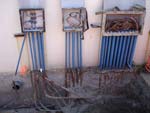
Case Study: Reliable Corrosion Control
 Having worked extensively overseas and in 22 states, I have seen a fair amount of corrosion, but a wastewater treatment facility in my own backyard has the distinction of being the most corrosive job site that I have ever dealt with.
Having worked extensively overseas and in 22 states, I have seen a fair amount of corrosion, but a wastewater treatment facility in my own backyard has the distinction of being the most corrosive job site that I have ever dealt with.
The treatment facility is located near the beach in Crescent City, Calif., where the average annual rainfall is more than 60 inches. Chemicals used in the wastewater treatment process combine with salt air from the Pacific Ocean to create the ideal breeding ground for corrosion. The plant's conduit failed because the polyvinyl chloride-coating did not adhere properly to the metal substrate, thereby allowing corrosion to take hold. For this facility's electrical raceways and connections to work well, it must have the "right" conduit product.
Brown & Caldwell Engineering had specified PVC-coated galvanized rigid conduit for all outdoor and corrosive areas in this project but made it the contractor's responsibility to select the brand. The plant upgrade began in June 2007 and is expected to be completed in the spring.
Upfront cost advantages and long-term potential costs based on what is known about product performance and service life are both vital considerations. The cost to a utility—or any type of plant—due to downtime from product failure is high. I have seen many cases in which corrosion damage has harmed facility operation because short cuts were taken during the product selection process. Some people feel they can live with substandard equipment and systems. That approach can be expensive and potentially unsafe.
I have been familiar with PVC-coated conduit since 1990, first as an installer and now as a supervisor. The most effective way to find the best product for any given application is to conduct research and determine if it has been tested for performance and service life by an independent, objective source. This is especially important with a product line such as PVC-coated galvanized rigid conduit because all brands available in the United States meet exactly the same UL 6 standard and carry the same UL label relating to safety conformance. However, not all of them have passed third-party tests designed to evaluate product performance and predict service life.
ASTM D870 and ASTM D2247 (the two accepted tests designed to predict service life of a coating under heat and humidity conditions) product requirements are tested through the ETL-Verification label. Authorized by Intertek, an independent testing, inspection, and certification laboratory, ETL-Verified products are subject to quarterly audits to ensure ongoing compliance. ETL testing and consequently ETL-Verification is based on actual product performance as a predictor of reliable service life.
(The original Electrical Testing Labs, ETL, was founded by Thomas Alva Edison in 1896 to address lamp safety and performance. The ETL Verification for PVC-coated galvanized rigid conduit has been around since August 2005.)
Some brands have a documented, proven ability to perform in a corrosive environment over an extended time—a fact that has been evaluated and confirmed by a world-recognized, third-party source. My company uses Plasti-Bond RedH2OT PVC-coated galvanized rigid conduit on all of its job sites, because that brand carries the ETL label and therefore represents proven reliability. Other brands that carry the label are Permacote and Korkap.
To further educate myself and my staff, we visited the plant where Plasti-Bond is manufactured and have participated in a unique, instructional course called Corrosion College. The course, free to qualified specifiers, installers, and end users of PVC-coated conduit, provides proven solutions for preventing industrial corrosion. Offered once a month at a specialized facility in Gilmer, Texas, the course enables participants to earn continuing education units and, in some cases, professional development hours.
The importance of the course may be difficult to measure for businesses that don't consider how much corrosion can cost them. After I attended the course, I was more alert to the fact that corrosion damage is prevalent and costly. In addition to educating participants about the causes and methods for preventing corrosion, Corrosion College provides hands-on guidance in the proper installation of anti-corrosion products such as PVC-coated conduit. I feel that this experience has given our company the ability to save customers money year-in-and-year-out.
It all comes down to:
- Knowledge of what product has been proven to effectively fight corrosion; and
- Knowledge in how to identify and fight the high cost of corrosion by properly using the best available products.
About the Author
Randy Cox is with Colburn Electric in Eureka, Calif.